全新版大学英语综合教程第1册第2单元教案
全新版大学综合教程1电子教案unit2

全新版大学综合教程1 Unit 2二、教学目的1. 理解并掌握本单元的核心词汇和短语。
2. 通过阅读、听力、口语和写作等实践活动,提高学生的英语综合运用能力。
3. 培养学生的跨文化交际意识,了解不同文化背景下的生活习惯和思维方式。
三、课型新授课四、课时2课时五、教学重点1. 核心词汇和短语的理解与运用。
2. 阅读理解能力。
3. 听力理解能力。
4. 口语表达和写作能力。
六、教学难点1. 理解并运用本单元的核心词汇和短语。
2. 提高阅读速度和准确性,掌握阅读技巧。
3. 在听力过程中捕捉关键信息,提高听力理解能力。
4. 在口语表达和写作中运用正确的语法和词汇,表达清晰、流畅。
七、教学过程(一)导入新课1. 教师简要介绍本单元的主题和内容,激发学生的学习兴趣。
2. 学生自由讨论,分享自己对相关话题的看法和经验。
(二)讲授新课1. 阅读理解(1)教师引导学生快速浏览文章,了解文章大意。
(2)学生分组讨论,分析文章结构、段落大意和关键信息。
(3)教师总结,讲解文章中的难句和重点词汇。
2. 听力理解(1)教师播放听力材料,学生听后回答问题。
(2)教师讲解听力技巧,指导学生如何捕捉关键信息。
(3)学生分组讨论,分享听力感受和收获。
3. 口语表达(1)教师引导学生围绕本单元主题进行口语练习。
(2)学生分组进行角色扮演,模拟真实场景。
(3)教师点评,指导学生如何提高口语表达能力。
4. 写作(1)教师讲解写作技巧,指导学生如何组织文章结构。
(2)学生根据教师提供的写作框架,完成写作任务。
(3)教师点评,指导学生如何提高写作能力。
(三)巩固练习1. 学生完成课后练习,巩固所学知识。
2. 教师选取部分练习进行讲解,帮助学生解决疑难问题。
(四)归纳小结1. 教师总结本单元所学内容,强调重点和难点。
2. 学生回顾所学知识,分享学习心得。
(五)作业布置1. 学生预习下一单元内容,为下一节课做好准备。
2. 完成课后练习,巩固所学知识。
全新版大学英语1_教案
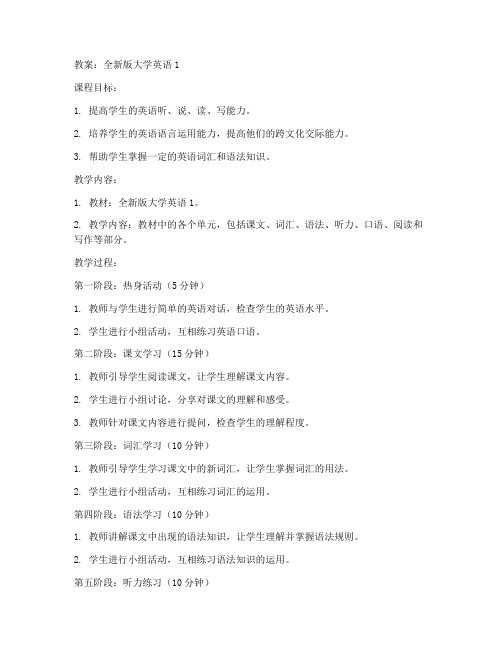
教案:全新版大学英语1课程目标:1. 提高学生的英语听、说、读、写能力。
2. 培养学生的英语语言运用能力,提高他们的跨文化交际能力。
3. 帮助学生掌握一定的英语词汇和语法知识。
教学内容:1. 教材:全新版大学英语1。
2. 教学内容:教材中的各个单元,包括课文、词汇、语法、听力、口语、阅读和写作等部分。
教学过程:第一阶段:热身活动(5分钟)1. 教师与学生进行简单的英语对话,检查学生的英语水平。
2. 学生进行小组活动,互相练习英语口语。
第二阶段:课文学习(15分钟)1. 教师引导学生阅读课文,让学生理解课文内容。
2. 学生进行小组讨论,分享对课文的理解和感受。
3. 教师针对课文内容进行提问,检查学生的理解程度。
第三阶段:词汇学习(10分钟)1. 教师引导学生学习课文中的新词汇,让学生掌握词汇的用法。
2. 学生进行小组活动,互相练习词汇的运用。
第四阶段:语法学习(10分钟)1. 教师讲解课文中出现的语法知识,让学生理解并掌握语法规则。
2. 学生进行小组活动,互相练习语法知识的运用。
第五阶段:听力练习(10分钟)1. 教师播放课文中的听力材料,让学生听懂并理解听力内容。
2. 学生进行小组活动,互相练习听力技巧。
第六阶段:口语练习(10分钟)1. 教师引导学生进行口语练习,让学生能够流利地表达自己的观点。
2. 学生进行小组活动,互相练习口语表达。
第七阶段:阅读练习(10分钟)1. 教师引导学生进行阅读练习,让学生能够快速阅读并理解文章内容。
2. 学生进行小组活动,互相分享阅读心得。
第八阶段:写作练习(10分钟)1. 教师引导学生进行写作练习,让学生能够准确地表达自己的观点。
2. 学生进行小组活动,互相评改写作作品。
第九阶段:总结与反馈(5分钟)1. 教师对本次课程进行总结,强调重点知识点。
2. 学生进行自我评价,反馈学习效果。
教学评价:1. 课堂参与度:学生参与课堂活动的积极程度。
2. 口语表达:学生口语表达的流利程度和准确性。
全新版大学英语综合教程教案1-unit2
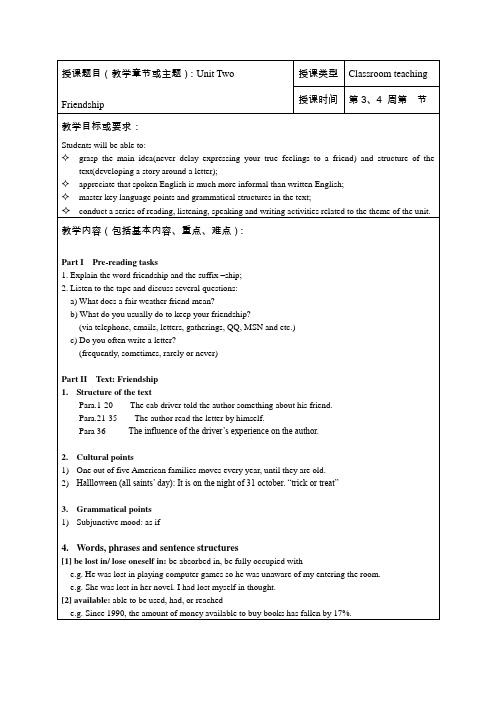
[5] know/ learn (sth.) by heart:memorize, remember exactly
e.g. You have to know all the music by heart if you want to be a concert pianist.
2)Hallloween (all saints’ day): It is on the night of 31 october. “trick or treat”
3.Grammatical points
1)Subjunctive mood: as if
4.Words, phrases and sentence structures
教学内容(包括基本内容、重点、难点):
Part I Pre-reading tasks
1. Explain the word friendship and the suffix –ship;
2. Listen to the tape and discuss several questions:
a) What does a fair weather friend mean?
[3] or something:used when you are not very sure about what you have just said
e.g. The air fare was a hundred and ninety-nine pounds or something.
e.g Here's some money. Get yourself a sandwich or something.
新版大学英语综合教程第一册 Unit2

Global Reading
• The following questions are what the narrator asked the cab driver. Put them in the right order.
1) Did you go to school together? 2) The letter must have made you feel good, didn’t it? 3) Is your cab available? 4) Is he someone you’ve known quite a while? 5) Is he dead? 6) I thought your friend was Ed. Why did he sign it Tom? 7) Is the letter from a child or a grandchild? 8) Did you two work at the same place?
3-7-4-1-5-8-2-6
Further Questions
• Part One: True or False 1. The driver caught a cold that day.
F He had just cried. 2. The driver had never seen Ed in the past 25 or 30 years. F He had only seen him once or twice a year.
Global Reading
Parts 1 2 3
Para(s)
Main Ideas
1-20 21-35
36
From a conversation with the cab driver the author learned how much he regretted failing to keep up correspondence with his old friend Ed.
《全新版大学英语综合教程》第1册教案
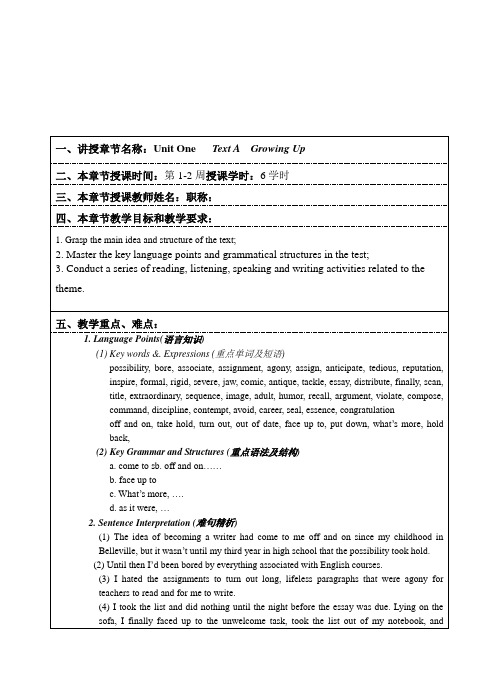
Section B.(略讲)
一、讲授章节名称:Unit TwoTextA. Friendship
二、本章节授课时间:第3-4周授课学时:6学时
三、本章节授课教师姓名:职称:
四、本章节教学目标和教学要求:
1. Grasp the main idea and structure of the text;
be lost in/lose oneself in, orsomething, go head, know/learn by heart, might/may (just) as well, not much of a, keep up, all the way, kind/sort of, lose touch, a couple of, on one’s mind, keepin touch(with), come up, go by, hang out, every now and then, choke up, in the distance, right awa
possibility, bore, associate, assignment, agony, assign, anticipate, tedious, reputation, inspire, formal, rigid, severe, jaw, comic, antique, tackle, essay,distribute, finally, scan, title,extraordinary, sequence, image, adult, humor, recall, argument, violate, compose, command,discipline, contempt, avoid, career, seal, essence, congratulation
全新版大学进阶英语1,Unit 2 教案

教学组织(含课堂教学内容、教学方法、辅助手段、师生互动、时间分配、板书设计等):教学内容:Part ⅠText:All Grown Up and Still in TowPart ⅡReading 1 Learning to Make a DifferencePart ⅢReading 2 Universities Encourage New Students to Go It AlonePart ⅣTheme-related Language Learning Tasks教学方法: eclecticismA theme-based and comprehensive from-input-to-output training approach辅助手段: Multi-media时间分配:This unit is designed for a six-to-eight period class. In each of the periods, certain tasks are to be completed.注:Reading 2和Opener一起处理,主要基于以下考虑:1)使用本书的学生应该都是新生,Reading 2是关于中国高校新生报到,内容非常贴近他们的生活;2)和主课文相比,Reading 2的语言较直接、明了。
这样由浅入深的安排更容易帮助学生进入学习状态。
Teaching ProceduresPart One: Opener1.Introduce the topic to the class either in English or Chinese.2.Play the song in Opener and ask Ss whether they know it or not.3.Tell Ss the background information about the song and guide them to read the words ofthe song.4.Play the song again and ask Ss to complete the task in Pair work.5.Play the song for the third time and ask Ss to discuss the questions in Groupwork.。
全新版大学英语综合教程第1册第2单元教案

全新版大学英语综合教程第1册第2单元教案Unit TwoFriendship教学目标:通过本单元的学习,掌握英文书信的写作技巧和方法,在生活中学会珍惜友情.教学重点:掌握单词;available estimate correspondence practicallyurge postpone reference reunion awful skip掌握词组;be lost in or something go ahead not much oflose touch on one's mind come up hang outchoke up教学难点:1.to grasp the main idea (never delay expressing your true feelingsto a friend) and structure of the text (developing a story arounda letter);2.to appreciate that spoken English is much more informal thanwritten English;3.to master key language points and grammatical structure in thetext;课时分配:1.Pre-Reading Tasks,New Words Explanation and Analysis 2学时2.While-Reading T asks and Analysis 4学时3.Post-Reading Tasks and Exercises 1学时4.Home-Reading Check up 1学时课外练习:1.Vocabulary;PartI II III 2.Structure;PartI II 推荐读物:<<大学英语>>第一册第二课教学过程:Study of the TextCulture NotesHalloween is celebrated annually. It is on the night of 31 October, when people once believed that ghosts could be seen. Now, in Britain and America, it is a time when children have parties, dress up as witches, make lanterns out of pumpkins from which the inside has been removed, and play "trick or treat'.Trick or treat is a traditional activity at Halloween. Children dress in costumes and visit houses. At each house they say "Trick or treat'. This means that they will play a "trick', or joke, on the people in the house unless they are given a "treat', e.g. sweets or money. Most people prefer to give treats rather than having tricks playedon them.Pre-reading tasks1.T asks Ss the following questions on the song That's What Friends are For;---What is a fair weather friend?(one who is happy to stay with you when things are going well but leaves as soon as trouble arrives)---According to the song, what are friends for?(for both good times and bad times) 2.Warm-up QuestionsDo you often write letters to friends?1)T writes down the following words on the blackboard: frequently, sometimes rarely, never.2)T invites several Ss to give reasons for writing or not writing letters.3)T sums up by saying: letters are the best in expressing our innermost feelings.3.Topic-related Prediction1)Before you read the story, think about the answers to the following questions.What does a cabbie do?What is a letter used for?Who wrote the letter to the cabbie?Why was all the cabbie had only a letter?2)Read the last sentence of Text A and try to guess what the story is about. While-reading tasks1.Read Text A as quickly as possible, and find out if you are right. Can you summarize the story with three sentences?key words: lost in thought, read a letter, an old friend, lifelong friendship, regret, author decided2.Scan the text and find out how many questions the narrator asked the cabbie and what were the latter's responses.----At first, did you mistake Ed for the writer of this letter?----Which round of question-and-answer leads to the mistake?(the second round)3.Ss do Text Organization exercise on page 40./doc/1714972056.html,nguage study and text analysis1)be lost in/lose oneself in:be absorbed in, be fully occupied withe .g: He was lost in playing computer games so he was unaware of my entering the room.I had lost myself in thought.2)available: able to be used, had, or reachede.g. Since 1990, the mount of money available to buy books has fallen by 17%.We have already used up all the available space.3)He sounded as if he had a cold or something: This sentence implies the sad state mind the taxi driver was in.or something: used when you are not very sure about what you have just saide.g. The air fare was a hundred and ninety-nine pounds or something.Here's some money. Get yourself a sandwich or something.4)go ahead: continue, begin(sometimes followed by with + n)e.g. The board of directors will vote today on whether to go ahead with theplan.Henry will be late but we will go ahead with the meeting anyway.5)know/learn by heart: memorize, remember exactlye.g. You have to know all the music by heart if you want to be a concertpianist.The pupils are required to learn a classic poem by heart every day.6)At least they do with me because I'm on the road so much: At least lettersfrom home mean a lot to me because I travel a lot in a car for long distances.7)estimate: form a judgement about (a quantity or value)e.g. I estimate that the total cost for the treatment of the disease will gofrom$5,000 to $8,000.Bill's personal riches were estimated at $368 million.8)This isn't family.: This isn't a letter from my family.9)might/may(just) as well: not have a strong desire to do and may even slightlyreluctant about somethinge.g. Anyway, you're here; you might as well stay.The post office is really busy --we'll have to queue for ages to getserved. We might as well go home.10)I'm not much of a hand at writing.: I am not good at writing.not much of a: not a goode.g. Some people may think that doing housework for others is not much of acareer.He is not much of a father, but he is an outstanding professor.11)keep up: continue without stoppinge.g.: They risk losing their homes because they can no longer keep up therepayments.I was so hungry all the time that I could not keep the diet up for longerthan a month.12)correspondence: a)the act of writing, receiving or sending letters(不可加s, often followed by with + n)e.g. His interest in writing came from a long correspondence with a close friend.b)the letters that sb. receives or sendse.g. Mary really never mentions her step-mother in her correspondence.13)But I take it he's someone...:But I expect that he issomeone...e.g.: I take it(that) you've heard that all the students in my class have done a very good job in CET Band 4.14)practically: almost, but not completely or exactlye.g.: He'd known the old man for practically ten years.I know people who find it practically impossible to give up smoking.15)Went to school together? The complete sentence is like this: You went to schooltogether?(In colloquial English a declarative sentence with a rising tone may serve as a question.)16)neighborhood: one of the parts of a town where people livee.g.: It seemed like an ideal neighborhood to raise my children in.Houses in a good neighborhood are likely to be sold at a high price.17)kind of/sort of:("kind of”is esp.AmE, "sort of' esp.BrE) a little bit, in some way or degree(used before v. or after a link verb)e.g.: She wasn't beautiful. But she was kind of cute.The boy's description kind of gives us an idea of what's happening.18)lose touch(with sb.):meet or contact sb. less and less often, gradually stop writing,telephoning, or visiting theme.g.: I lost touch with my former classmates after graduation.In my job one tends to lose touch with friends19)a couple of:(infml)a few, more than one but not manye.g. Do you have a moment? There are a couple of things I'd like to talk to youabout.They promised the students that they would find a substitute teacher in acouple of days.20)But I realized that Old Ed was still on his mind when he spoke again, almost moreto himself than to me.: But I realized that the taxi driver was still thinking ofOld Ed when he spoke again. It seemed that he spoke more to himself than to me.on one's mind: in one's thoughts; of concern to one(If something is on your mind,you are worried or concerned about it and think about it a lot.)e.g.: Dealings on the stock market have been on his mind all the time.This travel plan has been on my mind all week.21)keep in touch(with sb): write, phone, or visit each other regularlye.g. The old man kept in touch with his children while living in a nursing house.While doing the research work in the antarctic, the professor kept in touch with his students via email.22)come up: a)happen, occur, esp. unexpectedlye.g.: "Sorry, I am late----something came up at home.'b)be mentioned or discussede.g.: The term "Project Hope' has come up a lot recently in the newspapers.23)urge: try very hard to persuade(often used in the pattern urge sb. to do sth.or followed by a that-clause. In the that-clause, "should' or the base form ofa verb is used.)e.g.: They urged the local government to approve plans for their reformprogramme.Sir Fred urged that Britain(should) join the European Monetary System.24)postpone: delay(usu. followed by n./gerund)e.g.: The couple had postponed having children to establish their careers.The Russian experts postponed dumping Mir(和平号Russia's space station)in the Pacific Ocean until March 23,2001.25)It had references to things that...:The letter made mention of things that...reference: a)the act of talking about sb./sth.,or mentioning them(usu. followedby to)e.g.: It was strange that he made no reference to any work experience in hisresume.b)the act of looking at sth. for informatione.g.: Keep their price list for further reference.26)"Like it says there,”..."About all we had to spend in those days was time.”: "Asthe letter says there,”..."though we didn't have much money we had a lot of free time.”27)absolutely: totally and completelye.g. Funding is absolutely necessary if research is to continue.There is absolutely no difference between the two oil-paintings.28)reunion: a party attended by members of the same family, school,or othergroup who have not seen each other for a long timee.g.: The soccer club holds an annual/yearly reunion.Before she went abroad for further study, the whole family had a big family reunion.29)...there are fewer and fewer still around.:...fewer and fewer of us are left alive.30)hang out: a)(infml: used mainly in AmE) stay in or near a place, for no particularreason, not doing very muche.g.: I often hung out in coffee bars while I was unemployed.b)hang clothes on a piece of string outside in order to dry theme.g.: What a pain!--It's raining and I've just hung the washing out.31)every now and then: sometimes, at timese.g.: Every now and then I have a desire to quit my tedious job.I still see Jane for lunch every now and then, but not as often as I used to.32)But for the last 20 or 30 years it's been mostly just Christmas cards.:But generally speaking we have sent only Chrismas cards to keep in touch with each other for the last 20 or 30 years.mostly: almost all; generallye.g.: They have invested their money mostly in expensive realestate.The guests at the wedding party are mostly friends of the bride.33)Your friendship over the years has meant an awful lot to me, more than I can say because I'm not good at saying things like that.: Your friendship over the years has been very important to me, more important than I can say because I'm not good at expressing my feelings.awful:(infml; used to add force) very great; very bad or unpleasante.g.: I have got an awful lot of work to do.I can't bear the awful smell of cigarette smoke.34)choke up: become too upset to speake.g.: When he learned the news of his friend's sudden death, he was so choked uphe couldn't say a thing.Losing my job left me completely choked up; I was so upset that I didn't know what to do.35)destination: the place to which sb. is going or being sente.g. Singapore is still our most popular holiday destination.Only half of the emergency supplies have reached their destination because of the bad weather.36)skip: pass from(one point, etc.) to another, disregarding or failing to act on whatcomes betweene.g.: The teacher skipped chapter five and said it wouldn't be on the test."As time is limited, we will have to skip some of the exercises in Unit 10,' said the teacher.37)right away: (infml)at oncee.g.: Tom has got a high fever; he should go and see a doctor right away.I wrote him a letter and posted it right away.5.What was the lesson the storyteller learned from the cabbie?(Never delayexpressing one's true feelings to one's friend.)6.T reads out the following sentences and Ss try to find out sentences ofsilmilar meaning in the text:---Go on reading your letter.(Go ahead and finish your letter.) ---I'm not used to writing letters.(I'm not much of a hand at writing.)---We were friends since our childhood. So our friendship has a long history.(We were kids together, so we go way back.)---For one reason or another you lose touch even though you never forget.(Youkind of lose touch even though you never forget.)---It is painful to lose any friend.(It's no fun to lose any friend.) T explains that since this story is developed mainly through the conversation between the cabbie and his passenger, it's language tends to be simpler and more colloquial, sentences tend to be shorter or even incomplete.Post-reading tasks1.T guides Ss through some after-text exercises.2.T checks on Ss' home reading(Text B).3.Ss do Part IV: Theme-related Language Learning Tasks.。
最新版新起点大学英语综合教程第一册unit2教案

Unit 2Section A: The Opera SingerTeaching Objectives:1. 理解课文的文章大意,学习音乐家不懈努力追求完美艺术的高尚精神。
理解课文 A 和 B 的文章大意,学习音乐家不懈努力追求完美艺术的高尚精神。
2. 理解和正确运用重点词汇、短语、主谓宾补句型、被动语态和疑问句。
理解和正确运用重点词汇、短语、主谓宾补句型、被动语态和疑问句。
3. 掌握两个易混淆元音的不同发音。
掌握两个易混淆元音 /e/ 和 / æ/ 的不同发音。
4. 学会正确使用名词。
学会正确使用名词。
5. 了解乐曲《高山流水》的由来,学习古人珍惜友谊的高尚情操。
了解乐曲《高山流水》的由来,学习古人珍惜友谊的高尚情操。
Teaching Procedures:Part 1: Warm-up Activities1. Matching:Learn the following words about different kinds of musical instrument, and match them to the pictures.2. Listen to the conversation. Then practice with your partner, using the words and phrases provided on the right.Part 2: Text A: The Opera SingerⅠ. Background Information1. Pedro Pablo SacristanPedro Pablo Sacristan (1973–– ), was born in Madrid. He was the second of six children and Pedro Pablo Sacristan (1973studied at the private school where his father worked as an athletic trainer. Despite being part of a very modest family, he had a good education in an atmosphere of deep Christian roots. Bedtime Stories is a project that combines his great love for writing stories, a disguised vocation for education and deep knowledge in the fields of technology.2. History of operaOpera, whose name comes from the Italian word work, is an art form in which singers and musicians perform a dramatic work combining text and musical score, usually in a theatrical setting. Opera is part of the Western classical music tradition. It started in Italy at the end of the16th century and soon spread throughout the rest of Europe.Ⅱ. Words and phrases1. matter有关系;要紧a. v. be important 有关系;要紧What does it matter whether he comes or goes? 他是来是去,又有什么关系呢?他是来是去,又有什么关系呢?b. n. affair, topic or situation being considered 事情;问题;情况事情;问题;情况It’s no laughing matter. 这可不是闹着玩的。
(全新版)大学英语《综合教程》第一册Unit(2).ppt

• 6. encounter: (fml) meet, esp. unexpectedly • Example: She encountered an old friend on the street. • 7. ... the lack of it: Here it refers to animal intelligence. • 8. reveal: make (sth.) known • Example: A survey of the Chinese diet has revealed that a growing number of children in cities are overweight. • 9. convince: make (sb.) feel sure by the use of argument or evidence (used in the patterns: convince sb. of sth., convince sb. that) • Examples: 1) His parents managed to convince him that teaching was the most suitable profession for him. • 2) We finally convinced the police of our innocence. • (be convinced: feel certain that sth. is true • Example: I was convinced that we were doing the right thing.)
• 10. dominant: ruling; stronger, more powerful, or more noticeable than other people or things • Examples: 1) Charlie Chaplin was a dominant figure in the American film industry. 2) a dominant position 统治地位 • 11. make a deal: reach an agreement or arrangement, esp. in business or politics • Examples: 1) I'll make a deal with you — you wash the car and I'll let you use it tonight. • 2) The car company has made a deal with a Japanese firm, which will supply engines in exchange for brakes. • 12. ... only to be met with a blank stare: • Only to (do sth.) is often used to indicate that sb. did sth. with a disappointing or surprising result. Infinitive to functions as result adverbial. • Examples: 1) He hurried to the railway station, only to find that the train had left. 2) He had once tried inviting her out, only to meet with a rather cool response.
(全新版)大学英语《综合教程》第一册 Unit 2

you have just said
• Examples: 1) The air fare was a hundred and ninety-nine pounds or something.
•
2) Here's some money. Get yourself a sandwich
• A surprising ending is usually adopted in stories. Many great writers have tried this writing method. The most typical one is O.Henry, American writer of short stories. He was best known for his ironic plot twists and surprise endings. His style of storytelling later became a model not only for short fiction, but also for American motion pictures and television programs.
Halloween
Halloween is celebrated annually. It is on the night of 31 October, when people once believed that ghosts could been seen. Now, in Britain and America, it is a time when children have parties, dress up as witches, make lanterns out of pumpkins from which the inside has been removed, and play “trick and cheat”.
新通用大学英语综合教程第1册教学设计
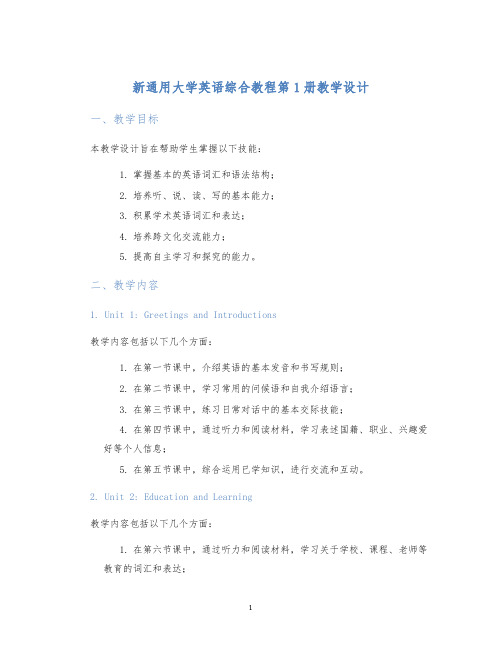
新通用大学英语综合教程第1册教学设计一、教学目标本教学设计旨在帮助学生掌握以下技能:1.掌握基本的英语词汇和语法结构;2.培养听、说、读、写的基本能力;3.积累学术英语词汇和表达;4.培养跨文化交流能力;5.提高自主学习和探究的能力。
二、教学内容1. Unit 1: Greetings and Introductions教学内容包括以下几个方面:1.在第一节课中,介绍英语的基本发音和书写规则;2.在第二节课中,学习常用的问候语和自我介绍语言;3.在第三节课中,练习日常对话中的基本交际技能;4.在第四节课中,通过听力和阅读材料,学习表述国籍、职业、兴趣爱好等个人信息;5.在第五节课中,综合运用已学知识,进行交流和互动。
2. Unit 2: Education and Learning教学内容包括以下几个方面:1.在第六节课中,通过听力和阅读材料,学习关于学校、课程、老师等教育的词汇和表达;2.在第七节课中,练习围绕教育话题进行交流;3.在第八节课中,通过听力和阅读材料,学习描述学习和学术的词汇和表达;4.在第九节课中,练习如何写好一篇英文作文,包括提纲、立意和语言表达;5.在第十节课中,通过阅读名人传记,了解优秀人物励志故事,培养学生的人文素养和文化兴趣。
三、教学方法为了达到预期的教学目标,本课程将采用多种教学方法与形式,包括:1.听说读写训练:鼓励学生多听多说,多读多写,提高英语综合应用能力;2.小组讨论:利用小组互动的方式,深入交流和思考话题;3.视听材料学习:通过看电影、听音乐等形式,扩大学生的语言视野和文化知识;4.分组演讲:培养学生口头表达能力和团队合作精神;5.阅读作业:通过阅读名人传记等材料,提升学生的阅读理解和文化素养。
四、教学评价为了实现教学质量的有效评估,本课程采取以下评价方式:1.出席率:考勤管理,要求学生至少出席80%的课程;2.作业完成率:平时布置有关听力、阅读、口头表达和写作的作业,要求学生完成并及时提交;3.组内评价和反馈:要求学生在小组内相互评价和反馈,提高学生对自己和互动团队的认识和实际表现;4.总评成绩:期末考试将占总成绩60%的比重,平时成绩占40%的比重,最终分数按照等级制公布。
大学英语全新版第一册教案
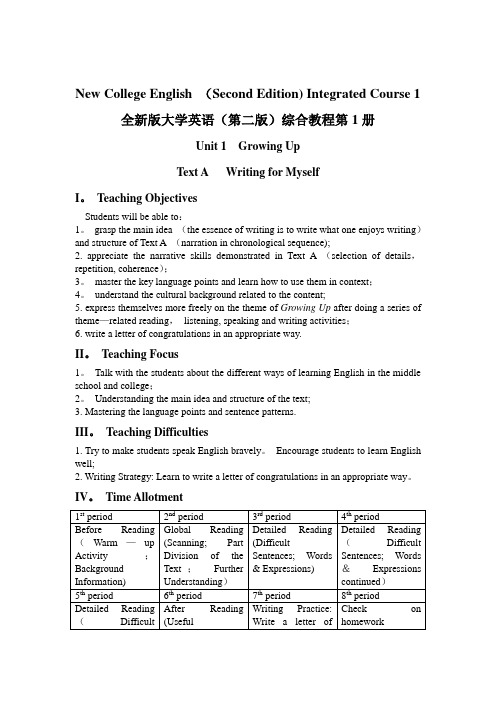
New College English (Second Edition) Integrated Course 1 全新版大学英语(第二版)综合教程第1册Unit 1 Growing UpText A Writing for MyselfI。
Teaching ObjectivesStudents will be able to:1。
grasp the main idea (the essence of writing is to write what one enjoys writing)and structure of Text A (narration in chronological sequence);2. appreciate the narrative skills demonstrated in Text A (selection of details,repetition, coherence);3。
master the key language points and learn how to use them in context;4。
understand the cultural background related to the content;5. express themselves more freely on the theme of Growing Up after doing a series of theme—related reading,listening, speaking and writing activities;6. write a letter of congratulations in an appropriate way.II。
Teaching Focus1。
Talk with the students about the different ways of learning English in the middle school and college;2。
全新版大学英语综合教程第一册2教学教材

Foster Furcolo
He must have been completely lost in something he was reading because I had to tap on the windshield to get his attention. "Is your cab available?" I asked when he finally looked up at me. He nodded, then said apologetically as I settled into the back seat, "I'm sorry, but I was reading a letter." He sounded as if he had a cold or something. "I'm in no hurry," I told him. "Go ahead and finish your letter." He shook his head. "I've read it several times already. I guess I almost know it by heart." "Letters from home always mean a lot," I said. "At least they do with me because I'm on the road so much." Then, estimating that he was 60 or 70 years old, I guessed: "From a child or maybe a grandchild?"
(全新版)大学英语《综合教程》第一册Unit2

• II. Language Study
• 1. be lost in/ lose oneself in: be absorbed in, be fully occupied with • Examples: 1) He was lost in playing computer games so he was unaware of my entering the room. • 2) She was lost in her novel. I had lost myself in thought. • 2. available: able to be used, had, or reached • Examples: 1) Since 1990, the amount of money available to buy books has fallen by 17%. • 2) If you don't want to buy a kite, you can make your own using directions available in the book. • 3) We have already used up all the available space.
• 3. Spaghetti and the proper way of eating it: Spaghetti is the
Italian-style thin noodle, cooked by boiling and served with sauce. Usually you would put a fork into a plate of spaghetti, turn the fork several times so that spaghetti will wind around the fork, then place the fork into your mouth. It's impolite to suck.
综合英语(第一册)电子教案Unit2Friendship

Unit2 FriendshipPeriod: 2Teaching Content: Unit2 Friendship(1)Listening and Speaking /Reading Text AAims of Teaching1. To improve the listening and speaking abilities of Ss’2. To improve Ss’ reading ability.Main points in teaching1. Understand the main ideas of Text A and master the useful sentence structures, words and expressions.2. Develop ss’ basic language skills by listening and speaking.Difficult points in teachingUnderstanding of some difficult sentencesTeaching procedures:The first lessonStep1 Lead-inFriendship is like an everyday necessity to us and we cannot live without friends. As friends, we should be honest, royal, reliable and helpful to each other and we should not deceive or betray each other, but believe, respect, understand and appreciate each other. We should also be warm-hearted, enthusiastic, generous and helpful to each other especially when our friends are in trouble.A true friend never cares about our possessions or social status. He or she may live far away from us, but emotionally he or she is very close to us. So, we can chat about everything and share our happiness and hardships with them. In this way, we can fully enjoy our life so that we will feel that our world is getting more and more beautiful and attractive.We hope we can have as many friends as we can, because the more friends we have, the happier we will be.Step2ListeningActivity 1 Sound RecognitionActivity 2 ConversationActivity 3 PassageQuestions and Answers1. Q: What can we know about Mr. Black from the passage?A: He was a very nice doctor.2. Q: Why did people like him and believe him?A: Because he was always ready to help his patients.3. Q: Why did people go to see other doctors when Black was old?A: Because his memory became weak.4. Q: What did people worry about if they went to see him?A: He might give them wrong medicine.5. Q: How did people make him happy when they did not go to see him?A: They told him that there were no patients then.Step3 SpeakingActivity 1A: What time is it now?B: Sorry, I don’t know it exactly.A: Why?B: Because my watch is 4 minutes slow.A: Then what time is it by your watch?B: It’s 7:08 a.m..A: Thank you.B: You’re welcome.Activity 2A: Would you please tell me how to ask about the time politely?B: Yes. There’re several ways of doing that.A: Tell me something about it, would you?B: Yes. First, I think, we’ll have to ask in a polite way, such as “Would you please tell me what time is it now?”A: Oh, I see. We should express ourselves by using some special words or sentence patterns.B: That’s right. Besides, we should express ourselves with some polite body language, such as smiling or nodding, etc.A: I’ve learned a lot from what you said. Thank you.B: You’re welcome.The second periodStep4 ReadingLead-in Activity DiscussionSamplesTrue friendship is a shoulder to rely on, a hand to hold, an ear to listen to your pain or someone to catch you when you fall. I quite agree with this statement. As an English proverb says, a friend in need is a friend in deed. If I feel sad, my friend can listen to me and give me support so that I can have great courage to go on with my work.True friendship is a caring voice, a comforting presence, a sentimental embrace (伤感时拥抱) or someone to wipe away tears. I think there is something in this saying.I think friends should share happiness and hardship. Every people need others’ help. It’s very good to get others’ help when we are in trouble. For example, we’ll feel much better if we can hear a caring voice w hen we’re sad.It’s very difficult for us to get a true friend in our life. If we get a true friend, we’ll be very happy and we should cherish it very much. We can talk with each other about our study and life, share happiness and hardship with each other so that we can improve our friendship.Step 5: Fast reading1 Ask ss to read Text A as fast as they can and to get the general idea of the passage. Then finish the “reading comprehension” on p322. Close books and concentrate on the recording of Text A3. Read the text aloudStep6 Homework1. Recite the new words on Text A and understand Text A2. Finish off Exs on p34-37Reflection on TeachingPeriod: 2Teaching Content: Unit2 Friendship (2)Reading Text A Grammar/Translation and WritingAims of Teaching:1. To develop ss’ ability of understanding a passage2. To learn some basic knowledge of translationMain points of Teaching:1. The usage of some words and expressions2. Understand the main ideas of Text ATeaching difficult points:Some difficult sentencesTeaching procedures:The first periodStep1 Everyday Report by studentsStep2 Explain the exercisesAsk some students to write their answers on the blackboard, then check the answers with the whole class.Step3 The main idea of Text ADivide the class into seven groups, and ask them to discuss the main idea of the passage. Then let some groups to express their opinions.Step4 Language pointshighest form of human relationshipexactly the samekey to opening upon everythingelse's done is done7. practice respect forhis or her ownfocused onbehind your backThe second periodStep5 Translation and WritingKnow about translation: How to choose the right meaning of a word. As we all know, each English word has more than one meaning, which means it has different meaning when in different situations. So, selecting the suitable meaning to express is of great importance while translating.Step6 Finish the Ex on p43.Key to the exercise1.我们的飞机降落在杭州萧山机场。
《全新版大学英语综合教程》第1册教案设计

2.Master the key language points and grammatical structures in the test;
3. Conduct a series of reading, listening, speaking and writing activities related to the
off and on, take hold, turn out, out of date, face up to, put down, what’s more, hold back,
(2) Key Grammar and Structures (重点语法及结构)
a. come to sb. off and on……
(5) Neither Doris nor I had ever eaten spaghetti, and none of the adults had enough experience to be good at it.
(6) I was preparing myself for a command to report to Mr. Fleagle immediately after school fordisciplinewhen I saw him lift my paper form his desk and knock for the class’s attention.
(2) Until then I’d been bored by everything associated with English courses.
(3) I hated the assignments to turn out long, lifeless paragraphs that were agony for teachers to read and for me to write.
全新版大学英语综合教程Book1 Unit 2 Friendship 精品课件
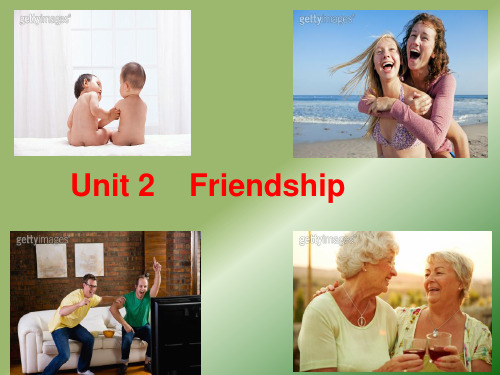
• Have you ever written any letters to your friends? • Suppose you are going to write a letter to one of your friends, whom are you going to write to and what are you going to write about?
be lost in / lose oneself in: 专心致志于…..
be absorbed in; be fully ocห้องสมุดไป่ตู้upied with
He was lost in playing computer games so he was unaware of my entering the room.
or something (/or something like that)
used when you are not very sure about what you have just said 诸如此类的事
The air fare was a hundred and ninety-nine pounds or something. Here’s some money. Get yourself a sandwich or something.
我估计她有35岁。 I estimate her age at 35.
2. n. approximate calculation or judgment made about a quantity or value估计
My estimate of her character was wrong.
might / may (just) as well: 不妨.
全新版大学英语综合教程第1册教案设计
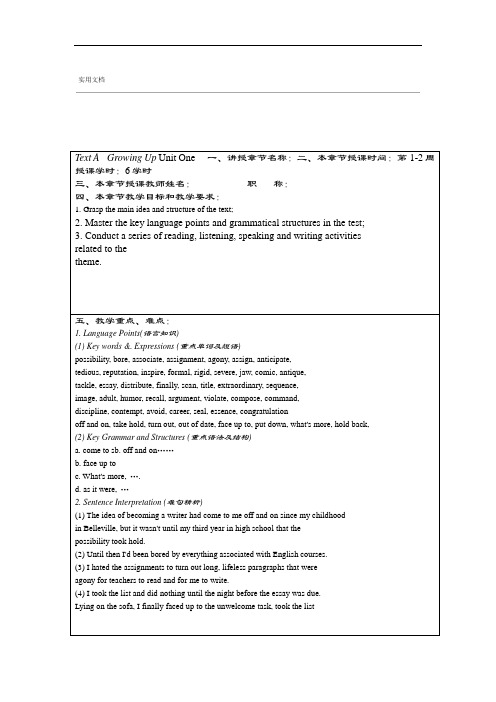
(精讲)Section A.) 15 minutes导入Step One Pre-reading Activities (Step Two While-reading Activities
) 120 minutes语言知识1. Language Points() 40 minutes难句精析2. Sentence Interpretation (Step Three Post-reading Activities 80 minutes
image, adult, humor, recall, argument, violate, compose, command,
discipline, contempt, avoid, career, seal, essence, congratulation
off and on, take hold, turn out, out of date, face up to, put down, what's more, hold back,
in Belleville, but it wasn't until my third year in high school that the
possibility took hold.
(2) Until then I'd been bored by everything associated with English courses.
3. Conduct a series of reading, listening, speaking and writing activities
related to the
theme.
五、教学重点、难点:
1. Language Points(语言知识)
- 1、下载文档前请自行甄别文档内容的完整性,平台不提供额外的编辑、内容补充、找答案等附加服务。
- 2、"仅部分预览"的文档,不可在线预览部分如存在完整性等问题,可反馈申请退款(可完整预览的文档不适用该条件!)。
- 3、如文档侵犯您的权益,请联系客服反馈,我们会尽快为您处理(人工客服工作时间:9:00-18:30)。
Unit TwoFriendship教学目标:通过本单元的学习,掌握英文书信的写作技巧和方法,在生活中学会珍惜友情.教学重点:掌握单词;available estimate correspondence practicallyurge postpone reference reunion awful skip掌握词组;be lost in or something go ahead not much oflose touch on one's mind come up hang outchoke up教学难点:1.to grasp the main idea (never delay expressing your true feelingsto a friend) and structure of the text (developing a story arounda letter);2.to appreciate that spoken English is much more informal thanwritten English;3.to master key language points and grammatical structure in thetext;课时分配:1.Pre-Reading Tasks,New Words Explanation and Analysis 2学时2.While-Reading Tasks and Analysis 4学时3.Post-Reading Tasks and Exercises 1学时4.Home-Reading Check up 1学时课外练习:1.Vocabulary;PartI II III 2.Structure;PartI II 推荐读物:<<大学英语>>第一册第二课教学过程:Study of the TextCulture NotesHalloween is celebrated annually. It is on the night of 31 October, when people once believed that ghosts could be seen. Now, in Britain and America, it is a time when children have parties, dress up as witches, make lanterns out of pumpkins from which the inside has been removed, and play "trick or treat'.Trick or treat is a traditional activity at Halloween. Children dress in costumes and visit houses. At each house they say "Trick or treat'. This means that they will play a "trick', or joke, on the people in the house unless they are given a "treat', e.g. sweets or money. Most people prefer to give treats rather than having tricks playedon them.Pre-reading tasks1.T asks Ss the following questions on the song That's What Friends are For;---What is a fair weather friend?(one who is happy to stay with you when things are going well but leaves as soon as trouble arrives)---According to the song, what are friends for?(for both good times and bad times) 2.Warm-up QuestionsDo you often write letters to friends?1)T writes down the following words on the blackboard: frequently, sometimes rarely, never.2)T invites several Ss to give reasons for writing or not writing letters.3)T sums up by saying: letters are the best in expressing our innermost feelings.3.Topic-related Prediction1)Before you read the story, think about the answers to the following questions.What does a cabbie do?What is a letter used for?Who wrote the letter to the cabbie?Why was all the cabbie had only a letter?2)Read the last sentence of Text A and try to guess what the story is about. While-reading tasks1.Read Text A as quickly as possible, and find out if you are right. Can you summarize the story with three sentences?key words: lost in thought, read a letter, an old friend, lifelong friendship, regret, author decided2.Scan the text and find out how many questions the narrator asked the cabbie and what were the latter's responses.----At first, did you mistake Ed for the writer of this letter?----Which round of question-and-answer leads to the mistake?(the second round)3.Ss do Text Organization exercise on page 40.nguage study and text analysis1)be lost in/lose oneself in:be absorbed in, be fully occupied withe .g: He was lost in playing computer games so he was unaware of my entering the room.I had lost myself in thought.2)available: able to be used, had, or reachede.g. Since 1990, the mount of money available to buy books has fallen by 17%.We have already used up all the available space.3)He sounded as if he had a cold or something: This sentence implies the sad state mind the taxi driver was in.or something: used when you are not very sure about what you have just saide.g. The air fare was a hundred and ninety-nine pounds or something.Here's some money. Get yourself a sandwich or something.4)go ahead: continue, begin(sometimes followed by with + n)e.g. The board of directors will vote today on whether to go ahead with theplan.Henry will be late but we will go ahead with the meeting anyway.5)know/learn by heart: memorize, remember exactlye.g. You have to know all the music by heart if you want to be a concertpianist.The pupils are required to learn a classic poem by heart every day.6)At least they do with me because I'm on the road so much: At least lettersfrom home mean a lot to me because I travel a lot in a car for long distances.7)estimate: form a judgement about (a quantity or value)e.g. I estimate that the total cost for the treatment of the disease will gofrom$5,000 to $8,000.Bill's personal riches were estimated at $368 million.8)This isn't family.: This isn't a letter from my family.9)might/may(just) as well: not have a strong desire to do and may even slightlyreluctant about somethinge.g. Anyway, you're here; you might as well stay.The post office is really busy --we'll have to queue for ages to getserved. We might as well go home.10)I'm not much of a hand at writing.: I am not good at writing.not much of a: not a goode.g. Some people may think that doing housework for others is not much of acareer.He is not much of a father, but he is an outstanding professor.11)keep up: continue without stoppinge.g.: They risk losing their homes because they can no longer keep up therepayments.I was so hungry all the time that I could not keep the diet up for longerthan a month.12)correspondence: a)the act of writing, receiving or sending letters(不可加s, often followed by with + n)e.g. His interest in writing came from a long correspondence with a close friend.b)the letters that sb. receives or sendse.g. Mary really never mentions her step-mother in her correspondence.13)But I take it he's someone...:But I expect that he is someone...e.g.: I take it(that) you've heard that all the students in my class have done a very good job in CET Band 4.14)practically: almost, but not completely or exactlye.g.: He'd known the old man for practically ten years.I know people who find it practically impossible to give up smoking.15)Went to school together? The complete sentence is like this: You went to schooltogether?(In colloquial English a declarative sentence with a rising tone may serve as a question.)16)neighborhood: one of the parts of a town where people livee.g.: It seemed like an ideal neighborhood to raise my children in.Houses in a good neighborhood are likely to be sold at a high price.17)kind of/sort of:("kind of”is esp.AmE, "sort of' esp.BrE) a little bit, in some way or degree(used before v. or after a link verb)e.g.: She wasn't beautiful. But she was kind of cute.The boy's description kind of gives us an idea of what's happening.18)lose touch(with sb.):meet or contact sb. less and less often, gradually stop writing,telephoning, or visiting theme.g.: I lost touch with my former classmates after graduation.In my job one tends to lose touch with friends19)a couple of:(infml)a few, more than one but not manye.g. Do you have a moment? There are a couple of things I'd like to talk to youabout.They promised the students that they would find a substitute teacher in acouple of days.20)But I realized that Old Ed was still on his mind when he spoke again, almost moreto himself than to me.: But I realized that the taxi driver was still thinking ofOld Ed when he spoke again. It seemed that he spoke more to himself than to me.on one's mind: in one's thoughts; of concern to one(If something is on your mind,you are worried or concerned about it and think about it a lot.)e.g.: Dealings on the stock market have been on his mind all the time.This travel plan has been on my mind all week.21)keep in touch(with sb): write, phone, or visit each other regularlye.g. The old man kept in touch with his children while living in a nursing house.While doing the research work in the antarctic, the professor kept in touch with his students via email.22)come up: a)happen, occur, esp. unexpectedlye.g.: "Sorry, I am late----something came up at home.'b)be mentioned or discussede.g.: The term "Project Hope' has come up a lot recently in the newspapers.23)urge: try very hard to persuade(often used in the pattern urge sb. to do sth.or followed by a that-clause. In the that-clause, "should' or the base form ofa verb is used.)e.g.: They urged the local government to approve plans for their reformprogramme.Sir Fred urged that Britain(should) join the European Monetary System.24)postpone: delay(usu. followed by n./gerund)e.g.: The couple had postponed having children to establish their careers.The Russian experts postponed dumping Mir(和平号Russia's space station)in the Pacific Ocean until March 23,2001.25)It had references to things that...:The letter made mention of things that...reference: a)the act of talking about sb./sth.,or mentioning them(usu. followedby to)e.g.: It was strange that he made no reference to any work experience in hisresume.b)the act of looking at sth. for informatione.g.: Keep their price list for further reference.26)"Like it says there,”..."About all we had to spend in those days was time.”: "Asthe letter says there,”..."though we didn't have much money we had a lot of free time.”27)absolutely: totally and completelye.g. Funding is absolutely necessary if research is to continue.There is absolutely no difference between the two oil-paintings.28)reunion: a party attended by members of the same family, school,or othergroup who have not seen each other for a long timee.g.: The soccer club holds an annual/yearly reunion.Before she went abroad for further study, the whole family had a big family reunion.29)...there are fewer and fewer still around.:...fewer and fewer of us are left alive.30)hang out: a)(infml: used mainly in AmE) stay in or near a place, for no particularreason, not doing very muche.g.: I often hung out in coffee bars while I was unemployed.b)hang clothes on a piece of string outside in order to dry theme.g.: What a pain!--It's raining and I've just hung the washing out.31)every now and then: sometimes, at timese.g.: Every now and then I have a desire to quit my tedious job.I still see Jane for lunch every now and then, but not as often as I used to.32)But for the last 20 or 30 years it's been mostly just Christmas cards.:But generally speaking we have sent only Chrismas cards to keep in touch with each other for the last 20 or 30 years.mostly: almost all; generallye.g.: They have invested their money mostly in expensive real estate.The guests at the wedding party are mostly friends of the bride.33)Your friendship over the years has meant an awful lot to me, more than I can say because I'm not good at saying things like that.: Your friendship over the years has been very important to me, more important than I can say because I'm not good at expressing my feelings.awful:(infml; used to add force) very great; very bad or unpleasante.g.: I have got an awful lot of work to do.I can't bear the awful smell of cigarette smoke.34)choke up: become too upset to speake.g.: When he learned the news of his friend's sudden death, he was so choked uphe couldn't say a thing.Losing my job left me completely choked up; I was so upset that I didn't know what to do.35)destination: the place to which sb. is going or being sente.g. Singapore is still our most popular holiday destination.Only half of the emergency supplies have reached their destination because of the bad weather.36)skip: pass from(one point, etc.) to another, disregarding or failing to act on whatcomes betweene.g.: The teacher skipped chapter five and said it wouldn't be on the test."As time is limited, we will have to skip some of the exercises in Unit 10,' said the teacher.37)right away: (infml)at oncee.g.: Tom has got a high fever; he should go and see a doctor right away.I wrote him a letter and posted it right away.5.What was the lesson the storyteller learned from the cabbie?(Never delayexpressing one's true feelings to one's friend.)6.T reads out the following sentences and Ss try to find out sentences ofsilmilar meaning in the text:---Go on reading your letter.(Go ahead and finish your letter.)---I'm not used to writing letters.(I'm not much of a hand at writing.)---We were friends since our childhood. So our friendship has a long history.(We were kids together, so we go way back.)---For one reason or another you lose touch even though you never forget.(Youkind of lose touch even though you never forget.)---It is painful to lose any friend.(It's no fun to lose any friend.)T explains that since this story is developed mainly through the conversation between the cabbie and his passenger, it's language tends to be simpler and more colloquial, sentences tend to be shorter or even incomplete.Post-reading tasks1.T guides Ss through some after-text exercises.2.T checks on Ss' home reading(Text B).3.Ss do Part IV: Theme-related Language Learning Tasks.。
